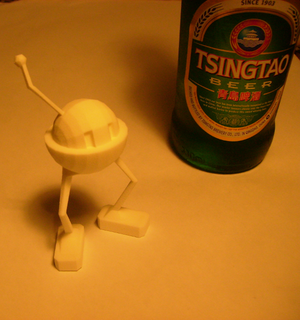This 3d printing stuff is addictive.
Science tries to give us a better understanding of our reality. A better understanding, or model of our reality allows us to make more accurate predictions about what will happen next. Having a good model of what will happen next allows us to benefit by making decisions which will result in increased happiness and avoiding decisions which will result in decreased happiness. The way that science works begins with someone using their imagination to make a hypothesis. A hypothesis is an untested idea. A hypothesis is by definition incorrect much of the time, and unproven all of the time. It is neccessary to have hypotheses in order to have science.
An athiest believes that religious people have a model of reality which will not serve them well in making predictions. That means that they make suboptimal decisions which make their lives, and often the lives of others, worse. Therefore it is optimal for an athiest to try and encourage people in the world towards a scientific way of thinking.
I do not believe that it is constructive or optimal to antagonise people who have an incorrect model of the universe. I think, for example, that publishing cartoons which offend an incorrect person is suboptimal when it comes to the goal of enlightening them. I think a much better strategy is to give them as much information as possible so that they can arrive at their own conclusions based on the available data, and disprove their own existing incorrect hypotheses. I think that it is optimal, constructive, and safer to respect all people, including those who you think are wrong.
I think that education is a better strategy than disrespect and mockery.
It's probably not possible for a human to have a 100% accurate model of reality (otherwise that model would be reality itself). This means that each of us has a flawed model of reality. All of us are incorrect people, hence all of us can only make predictions with limited accuracy, and importantly, we require other people to build a consensus model that is more correct than the one we might individually hold.

To summarise, we should tolerate people who are wrong because:
- It is neccessary to be wrong in order to form hypotheses and progress science. (It is neccessary to be wrong before you can be right.)
- Antagonising people who are wrong does not help us all make better models about reality, as much as educating them, and it often has an adverse effect of making us less safe.
- We are all mostly wrong, and probably always will be.

There is a new Python conference running this year for the first time. It's in Sydney, Australia, at the end of June. I'll be speaking, and I'm very excited about attending too; there are a number of high quality topics evident in the conference schedule. I'm particularly happy not to have a clashing time slot with my friend and occasional colleague, Simon Wittber, as his talk looks fascinating. If you are into Python, you should go!
With the recent news that Android phones are outselling phones running the iPhone OS in the USA in the first quater of 2010, I wanted to write down something that I have been ranting at my more patient friends for the last few months. The open development platform style of Android is like evolution, whilst the closed Apple platforms are more like intelligent design.
- Apple periodically come out with a single near-perfect product.
-
Android products get incrementally better with each iteration from each phone company.
-
Apple must make every product a hit - they can't afford failures like Apple TV. Failures are very expensive for Apple.
-
Android allows Google to outsource failure. Infact, failures by the 3rd party companies who make Android phones actually help the evolution of other Android products as all products in that class can learn and benefit from the mistakes of eachother. This is like the transfer of genetic information. Failing phones are part of the survival of the fittest style of interaction that occurs in nature.
-
Like the traditional Mac platform strategy, the iPhone strategy is about elite, expensive, "cool" devices with fantastic usability.
- The Android strategy is more like the PC platform of years past. It will result in a wide choice of generally uglier phones that don't work as well as the iPhone, but that slowly get better and better. Everyone will use them anyway, much to the confusion of die-hard Apple fans. This will be because market pressures will ensure that the cheapest phones of the highest quality, which give the user the most control and choice, will be the most popular. Often the most successful new designs will be copied from market leaders like Apple and other Android makers.
Evolution is dirty, ugly, and messy, but the end result is always more successful in a competitive ecosystem. It's interesting to consider which strategy will be more robust in the smartphone market.
- vectors vs pixels
- stems vs downmix
- modfiles/patches vs wavs
- meshes vs render
- tabs vs spaces
Usually I choose to store and edit the things on the left hand side.





